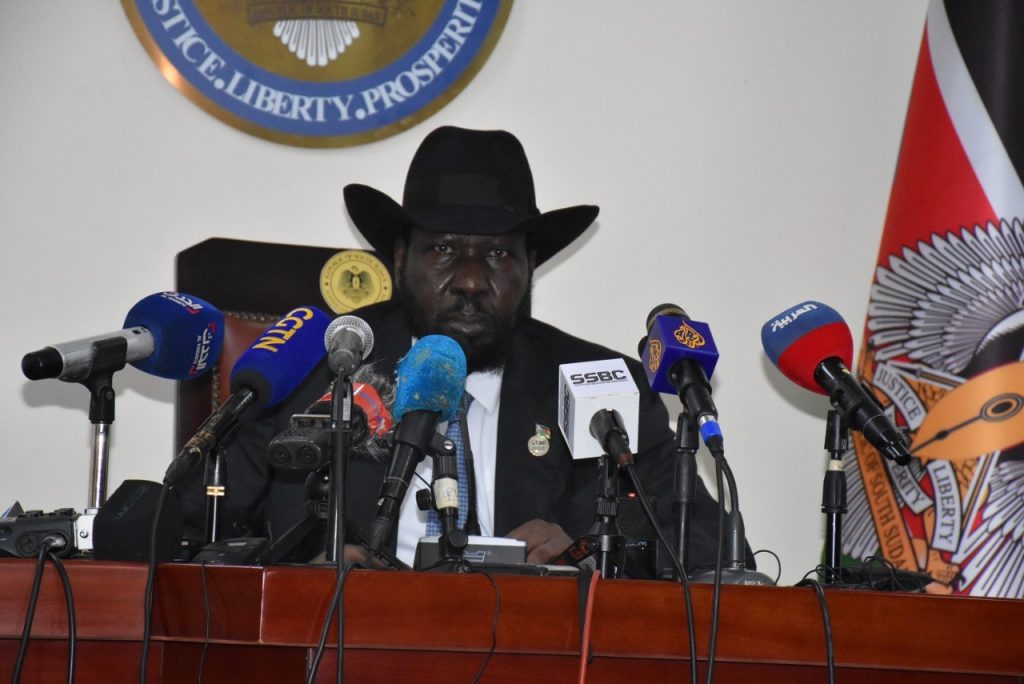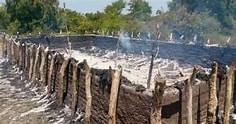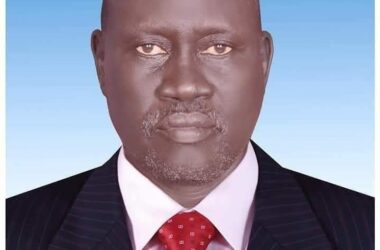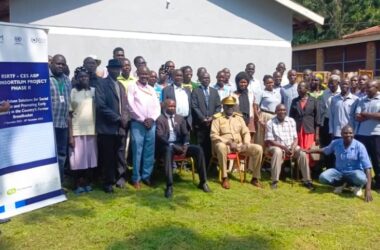
By Philip Buda Ladu
The government has released for the first time a report on the root causes of the 2013 and 2016 conflicts that ravaged the youngest East African Country barely two years after gaining independence from the Republic of Sudan in July 2011.
The classified information which had been concealed from the public was released on Tuesday after President Salva Kiir Mayardit announced in a news conference Monday that he was directing the National Security Services (NSS) to declassify information about the root causes leading to the 2013 and 2016 conflicts in the country to pave way for a genuine reconciliation.
Kiir in his news conference Monday told journalists that for the implementation of the September 2018 Revitalized Peace Agreement to be genuine, they need transparency on the root causes of the conflicts.
He assured the public of the release of classified information about the genesis of the conflicts in the country aimed at bringing genuine reconciliation and healing.
“It is for this reason that I am directing the National Security Services and its partners, the BRL law firm to declassify all information about the conflicts genesis in their possession including; intercepts, audios and personal accounts,” he told journalists Monday at his office.
The President acknowledged that it is very important to release the concealed information in possession of the NSS about the genesis of the conflict so that people of South Sudan know the truth and judge for themselves from the position of this knowledge.
“We must say the truth because genuine reconciliation has its basis on it. This will also support the process of healing in or country,” asserted Kiir.
He consoled those who will be implicated by the report saying they will be pardoned.
“Having said that, I need to state clearly that those who maybe be implicated by the declassified information that is going to be released are guaranteed Presidential Pardon, so there is no cause for alarm over this,” Kiir comforted those implicated in the events.
The President stressed that all they are interested in is for the public to know the truth about the background of the conflicts in their country. “I believe after the release of the information we will all move forward with permanent peace building that will create harmony and prosperity in our country.
Report findings:
The report prepared for the government of South Sudan by the 9BR Chambers London, titled “Pushing The Reset Button for South Sudan” gives a detailed narrative of the developments that led to the 2013 and 2016 political crisis that plunged the country into a civil war paralyzing its economy.
No. 1 Citizen Daily Newspaper got the report that has been dated March 2022 which has been released for its first time since the government has been keeping it classified from public consumption, but finally decided to break the hell loose on the concealed government data.
The report’s executive summary, underlined that since the creation of South Sudan in 2011, the international community has ignored or rejected statements made by President Salva Kiir and the Government of South Sudan on the causes of the two main conflicts in 2013 and 2016.
This stance has led to the promulgation of an erroneous narrative that has prevented the world’s youngest nation from developing on its own terms.
In that report 9BR Chambers publicly released for the first time, information from phone intercept communications, reports, witness statements and other sources to establish the truth behind the violence which broke out in the attempted coup of 15th December 2013 and the subsequent coup attempt of July 8th 2016.
The sources reviewed proved the truth of President Kiir’s contemporaneous statements, namely the both attempted coups were carried out by Dr. Riek Machar and others with the aim of taking control of South Sudan for themselves.
The reports contradict the narrative issued by the United Nations Mission in South Sudan (UNMISS) as to the nature of conflict as well as the report of the African Union Commission of Inquiry on South Sudan that investigated the first attempted coup on 15th December 2013 and found no evidence to support the assertions of President of South Sudan and other leading officials.
Chapter One of the report sets out the evidence as to how Dr. Riek Machar planned the attempted coup of 15th December 2013 by both military and political means.
Taban Deng Gai was implicated as leading the military efforts in coordinating troops and weapons, with Brigadier General Peter Lim Bol Badeng Commander of Tiger Brigade 1 and officers in the Sudan People’s Liberation Army (SPLA).
Telephone intercepts revealed how the conspirators put into action their plans, this evidence corroborates the evidence produced in the investigation commission formed by Presidential Decree in 2014 conducted under the law of South Sudan.
President Salva Kiir’s explanation of 15th December 2013 was reported widely as an ‘alleged coup’ but framed as violence along ethnic and political lines. This misinterpretation of events led to a hastily introduced prescribed formula for peace-building and lengthy international intervention ever since; based upon an erroneous narrative, namely the violence was political and ethnically targeted.
Chapter 2 of the report analyzes the response of the international community to the attempted coup in Dec. 2013. Crucially, the United Nations, African Union, USA and the EU didn’t describe the events of 15th December 2013 as an attempted coup.
The preferred international response was a political crisis that escalated to violence carried out by the military and various armed groups. Ethnically and publically factionalism was named as the overriding causes.
The peace agreement thereafter has been underpinned by a need to address ethnic difference, largely informed external perceptions of these events.
Chapter 3 examines the interim events between the two attempted coups which illustrate a continued effort by the SPLM/A-IO under the leadership of Dr. Riek Machar to undermine and protract peace negotiations, exploit factional divisions and ultimately, destabilized the Government of South Sudan.
Meanwhile, chapter 4 examines the attempted coup of 8th July 2016 following his return to Juba in April 2016, Dr. Riek launched a charm offensive promoting peace, unity and solidarity with the government. On 8th May 2016, he called for “forgiveness and reconciliation in South Sudan”.
The reported revealed that on 22nd May 2016 Machar attended prayers at a predominantly ethnic Dinka church on Sunday, telling the congregation ‘that peace and reconciliation enables national healing and stability’.
However, the evidence from telephone intercepted communications from the same period revealed that Riek Machar as First Vice President of the Transitional Government of National Unity (TGoNU) plotted a coup to seize power on 8th July 2016.
Whilst he was presenting a unified front to the international community, in the background he was at the same time preparing forces of the SPLM/A-IO to carry out the coup using support from a foreign government, the Republic of Sudan to provide necessary arms and ammunitions.
Kiir on Monday said “the government don’t deny, minimize or shy away from prosecuting those who have committed crimes” adding that “we have demonstrated this through our actions, we have prosecuted people and imposed considerable prison sentences to those who were found guilty, including our own soldiers”.



